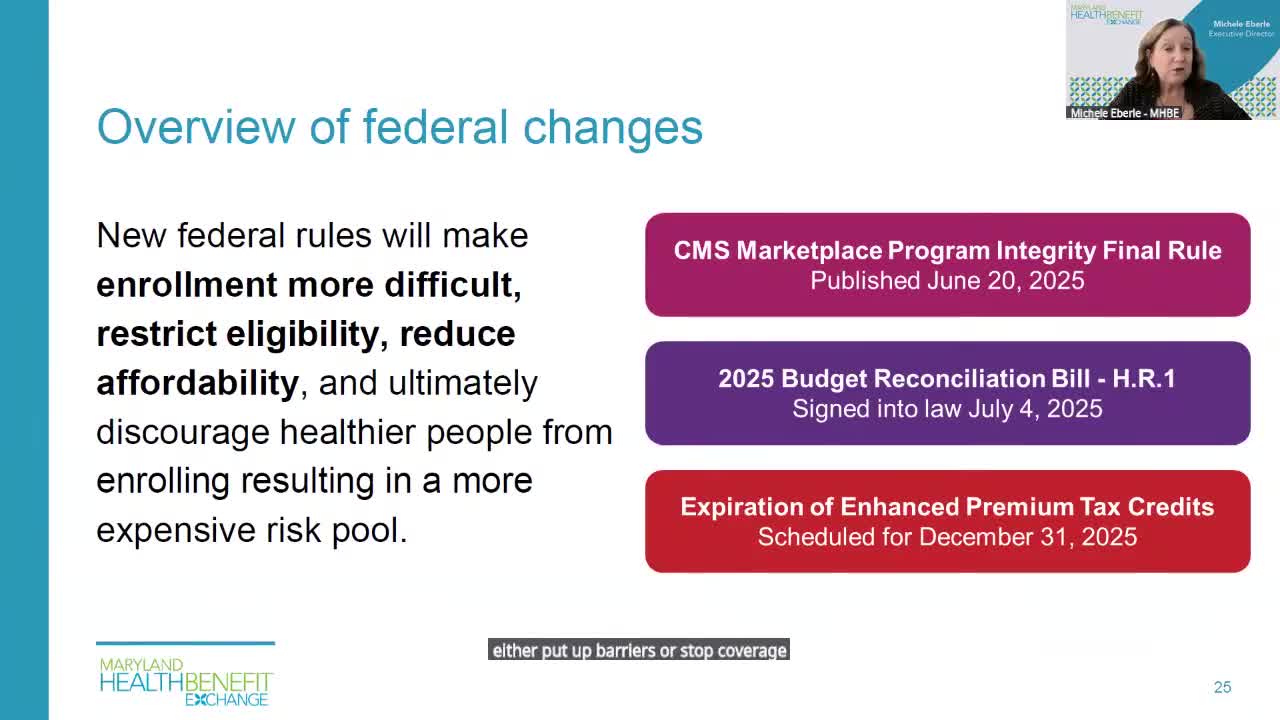Federal rules, HR 1 and marketplace integrity changes force coverage and subsidy shifts in Maryland exchange
Get AI-powered insights, summaries, and transcripts
Subscribe
Summary
State exchange officials told lawmakers that a June marketplace integrity rule, HR 1 and the likely end of enhanced federal premium tax credits will force immediate eligibility and operational changes, including terminating coverage for about 300 DACA recipients and removing premium tax credits for an estimated 20,000 lawfully present immigrants.
The Maryland Health Benefit Exchange told legislators that two recent federal actions — a marketplace program integrity final rule and HR 1 — plus the scheduled expiration of enhanced premium tax credits will meaningfully change who can receive financial assistance and when people can enroll.
Michelle Everly, executive director of the Maryland Health Benefit Exchange, said the June marketplace integrity rule required the Exchange to discontinue coverage for roughly 300 Deferred Action for Childhood Arrivals (DACA) recipients by September; the Exchange had worked with carriers so that consumers who paid full premiums could preserve accumulators and avoid new deductibles. She said the Exchange began notifying the 300 DACA enrollees in July.
Everly said another federal change will remove eligibility for premium tax credits for many lawfully present immigrants effective Jan. 1, 2026 (the Exchange estimated about 20,000 Marylanders will be affected; 17,000 were auto‑renewed in recent notices but without any tax credit applied). Those individuals can still purchase coverage but without APTCs (advanced premium tax credits), and the Exchange said it does not know how many will retain coverage at full price.
Operational impacts cited at the hearing - Call center volume and consumer confusion: Everly said Exchange call centers were receiving calls from consumers who learned only at point of care that their coverage had been terminated. - Income verification and enrollment timing: the federal rule reverts certain pandemic-era flexibilities. If income cannot be verified electronically, the Exchange must request documentation (e.g., pay stubs) within a 90‑day window (shorter than emergency extensions used during the pandemic). The special enrollment period for lowest‑income households (under 150% FPL) will be curtailed; the Exchange estimated about 1,000 Marylanders per month could be affected. - IRS reconciliation and failure‑to‑file flags: Everly briefed members that flags tied to tax filing and APTC reconciliation can disqualify consumers from receiving credits; when IRS operations are impaired (for example during a shutdown) consumers previously had trouble getting flags lifted.
Everly said open‑enrollment timing will also be affected by federal changes: the Exchange will not be able to run an open enrollment that extends into January beginning with the 2027 plan year, which the agency called an additional barrier to timely coverage for consumers.
Exchange response and next steps The Exchange said it delayed renewal notices by about a week to allow for potential congressional action and that it started marketing earlier than normal to encourage people to file taxes, update information and use coverage while it is available. Everly said the Exchange is preparing for technical and operational changes if Congress alters premium tax credit law during the enrollment window but warned that later federal action may not help the 2026 risk pool if carriers cannot refile rates in time.
Ending The Exchange urged consumers to check renewal notices, confirm income information, and use available navigators and brokers. It also signaled it will seek state flexibility from CMS and coordinate with sister agencies to manage operational changes.
